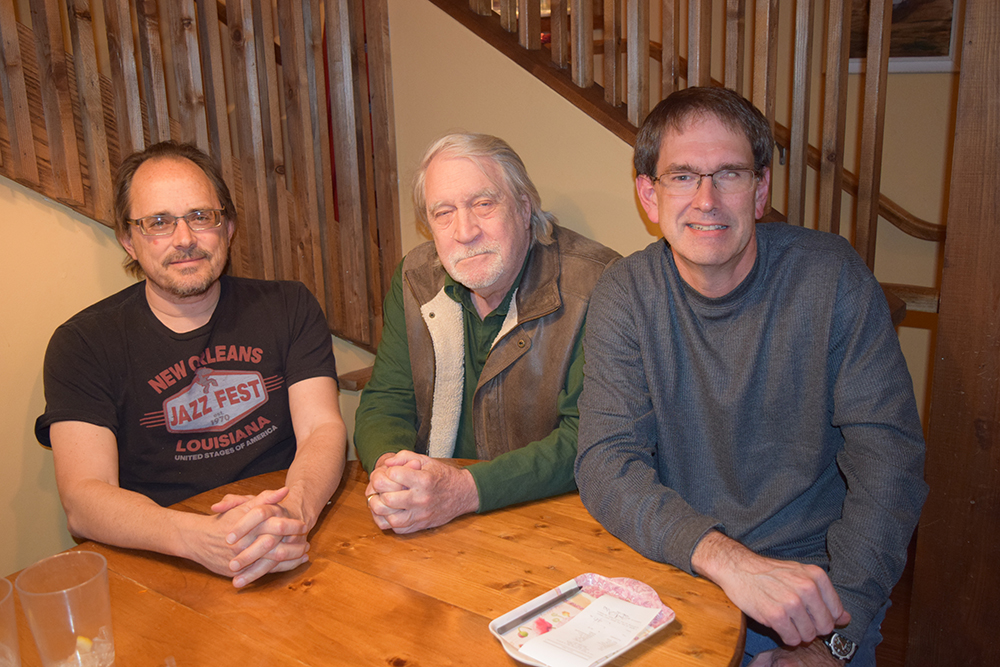By James FitzPatrick
Contributing Writer
How do communities govern themselves, discern fact from rumor, understand their own identity?
They need good information.
Once they have that information, how do they know the difference between the important and trivial, separate the wheat from the chaff?
They need good journalism.
Ocean City lost one of its finest journalists with the passing of John H. Andrus, II, former editor of The Ocean City Sentinel-Ledger, who died at home in Ocean City on May 15 following a battle with prostate cancer. He was 83.
I worked as a reporter for John Andrus from 1986 to 1990 and knew him as a mentor and a friend. He was an indispensable leader to his readers, guiding the newspaper’s coverage of key issues, and coaxing the debate about difficult problems into constructive directions.
With John Andrus at the helm, guiding his small staff of two reporters and one other editor, readers were engaged in their changing community, and entertained by the stories they told.
Ocean City was lucky to have him in the editor’s chair at a time when hometown publications were gatekeepers of local understanding and discourse. With no social media and few alternatives, stories lived or died based on whether they made it past the editor’s desk.
News judgment and accuracy were paramount because important news was always happening. At the time I signed on, America’s Greatest Family Resort was divided over its long-standing “blue laws.” Dating to the city’s founding as a religious retreat, the blue laws were an attempt to keep the sabbath day holy by restricting most Sunday business activities. They were eventually abolished, but not before a narrowly decided and bitterly fought referendum vote, which played out in the pages of the paper.
It was a time when the development rights of beachfront property owners were being tested in court, and non-resident property owners were organizing in quest of political influence commensurate with the property taxes they paid. John’s leadership and steady editorial hand made sure the right questions were asked, and the right people were held to account on these and other divisive and consequential issues.
The paper kept the public informed as sand mining and expanding residential development collided in a rapidly changing Upper Township, and Somers Point’s bayfront began a redevelopment journey that leveraged its maritime heritage into an engine for economic development.
The paper was there when Ocean City Mayor Roy Gillian stared down the state DOT by reducing the speed limits on the Route 52 Causeway, without permission, to make a point about highway safety. The Sentinel was also on point when a local bar caused community outrage by offering “dwarf tossing” as entertainment.

From left: Bill Barlow, John Andrus, and James FitzPatrick get together for lunch.
The news business was much different back then. The Sentinel-Ledger owned and operated its own printing plant which meant all of the pre-press work was done in-house. Reporters learned to lay out news pages by hand using pica rulers and sizing wheels. Typeset copy was trimmed using an Exacto knife and everything was held together with wax. Copy was edited with a pencil, tape and a pair of scissors. John taught us how to do all of that.
Instead of computers, smartphones and social media, there were typewriters, Rodexes and personal contact with sources. We were encouraged to develop face-to-face relationships with city clerks and building inspectors. He urged us to be familiar faces in City Hall.
Accuracy was essential, even if we had to ask questions over and over. How old? How much? Where are they from? John always insisted that we find out.
There was a priority on getting all the details. We were encouraged to take good notes and pay attention because you never knew when something newsworthy might pop up at a town meeting. Thanks to John’s instincts and experience, we learned that, with a follow-up phone call to the right person, an off-the-cuff remark could turn into an important story.
Each week, reporters compiled tidbits from their notebooks in “notes” columns. Even if we only had time to write a paragraph or two, John said it was better to put a paragraph or two on the record than nothing at all. Let the readers decide their significance, he would say. We learned to closely study important documents such as municipal and school budgets, staying on the lookout for line items that changed.
Often news value came down to John’s understanding of the political landscape. His knowledge of the Cape May County news environment was invaluable. Given his time spent working for The Atlantic City Press Cape Bureau, The Wildwood Leader, The Cape May Star and Wave, and The Cape May Herald, he knew whom to call, especially on stories with connections “down county.”
For a small publication The Sentinel-Ledger had a lot of moving parts. Ocean City was the hub, but it reported on Somers Point, Mainland Regional High School and Upper Township on the mainland, plus Sea Isle City to the south. It had a sports section and what was called social news (weddings, engagements, church and club news).
John pulled it together with a bare bones crew. During my time, there was Anita Spiegel, then Lee Steele covering Ocean City, Marie Huber as social editor, Tom Williams covering sports, and me covering the non-Ocean City municipal beats. Most of the photos were by Senior Studio. Regular readers will also remember columnists Mark Soifer, Ocean City events; Ed Wismer, entertainment; Joe Gilbert opinion, and Dave Carber, fishing.
The opinion page was anchored by John’s concise, solutions oriented editorials. He was direct when he saw errors in public policy, but he also encouraged both sides of an issue to find common ground when possible. There were political endorsements, letters from readers and laugh out loud political cartoons by Lee Steele.
Readers showed their love with a paid circulation of about 12,000. Even for part-time residents, the paper was a must-read for anyone wanting to stay on top of what was happening in their vacation community, as illustrated by the large number of summer residents who read the paper via subscription.
Looking back, it was a different time. We had no email, and the first time we received a fax was a momentous occasion, hand-delivered from the local stationery store because we didn’t yet own a machine. It wasn’t until I brought my PC to the office that a move toward acquiring a desktop publishing system was initiated.
What we lacked in technology we more than made up for in hard work and crazy hours. Often we got stories that the local daily paper missed.
We got important stories by following up, because we had earned the trust of people in the know.
We worked hard because our boss worked hard. It seemed like whenever I was in the office late or during closed hours, he was there too, his apartment being around the corner.
When Wednesday’s deadline was done, the paper was officially put to bed, and those big, loud, beautiful presses were rolling, we often retired to our favorite Somers Point watering hole, the Waterfront, or John’s deck, where he barbecued steaks for us, to go with a couple of beers. The second-floor apartment was less than a block from our Eighth Street office/printing plant. My job was always to make the salad.
He would share stories about his time as a lifeguard in Cape May, or as editor of the Cape May Star and Wave.
I was fortunate to become the Star and Wave editor when the Sentinel bought the paper in 1990. I was proud when I got his old job which, now that I think about it, he probably had something to do with. I followed in his footsteps, but I could never fill his shoes.
John was not warm and fuzzy. Some may have called him a curmudgeon. But that was only because he wasn’t satisfied with putting out anything but the best community newspaper possible. Looking back on what he was working with, what was expected of us, and what we achieved, he was a patient man.
Everything I know about community journalism I learned by sitting at his left hand for four years, answering his questions about my copy, seeing how he dealt with reader questions and complaints, making those follow-up calls he insisted on, and listening to his conversations with the characters who visited our four-desk “newsroom.”
After The Sentinel-Ledger, I was fortunate to work more than 25 years as an editor, where I put what I learned from John to work. For all the times I ever badgered one of my reporters by asking them for one more follow-up, I was channeling John.
After the Sentinel-Ledger, John went on to become editor of The Reminder, a publication in Millville. Upon his retirement in 2010, he wrote an editorial saying goodbye to his readers. It said a lot about who he was and why he did what he did.
Good journalism boils down and coalesces information into something others want to read because for them, it’s:
(a.) so well written; and,
(b.) important, educational, interesting, or entertaining.
So, this is what I’ve tried to do for 45 years, the past 13 here: give (in the literal sense of the REmindER) a journal of things deemed of value to you. And the answer to the opening question? It’s about words and people.
And, now I end doing that. Someone else will continue this journal, this product of words and pictures and toil that we hope you will read—because to be informed is to transfer the power of information from the source to the user.
Please, put the power to great use.
There will be a memorial service for John 11 a.m. Friday, May 31 at Cape May Presbyterian Church, 500 Hughes St., Cape May, where family and friends will be received from 10 to 11 a.m.
https://www.spilkerfuneralhome.com/obituaries/John-Andrus-3/#!/Obituary
Copy editor and Contributing Writer James FitzPatrick has been a community journalist in Atlantic and Cape May counties for more than 30 years, including 20 years as editor of The Current Newspapers. He lives in Hammonton.











